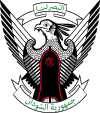Republic of the Sudan | |
|---|---|
 | |
| Polity type | Federal provisional republic |
| Constitution | 2019 Draft Constitutional Declaration |
| Legislative branch | |
| Name | Transitional Legislative Council |
| Type | Unicameral |
| Meeting place | Omdurman |
| Executive branch | |
| Head of state | |
| Title | Presidency |
| Currently | Transitional Sovereignty Council |
| Appointer | Commander-in-Chief of the Armed Forces |
| Head of government | |
| Title | Prime Minister |
| Currently | Osman Hussein (acting) |
| Appointer | Transitional Sovereignty Council |
The Government of Sudan is the federal provisional government created by the Constitution of Sudan having executive, parliamentary, and the judicial branches. Previously, a president was head of state, head of government, and commander-in-chief of the Sudanese Armed Forces in a de jure multi-party system. Legislative power was officially vested in both the government and in the two houses – the National Assembly (lower) and the Council of States (upper) – of the bicameral National Legislature. The judiciary is independent and obtained by the Constitutional Court.[1] However, following the Second Sudanese Civil War and the still ongoing genocide in Darfur, Sudan was widely recognized as a totalitarian state where all effective political power was held by President Omar al-Bashir and his National Congress Party (NCP).[2][3][4][5] However, al-Bashir and the NCP were ousted in a military coup on April 11, 2019.[6][7] The government of Sudan was then led by the Transitional Military Council (TMC).[8][9][10][11] On 20 August 2019, the TMC dissolved giving its authority over to the Transitional Sovereignty Council, who were planned to govern for 39 months until 2022, in the process of transitioning to democracy. However, the Sovereignty Council and the Sudanese government were dissolved in October 2021.[12]
- ^ "Africa :: Sudan — The World Factbook - Central Intelligence Agency". www.cia.gov. Retrieved October 3, 2019.
- ^ Adam, Ahmed H. "What next for Sudan after Bashir's nomination for a third term?". www.aljazeera.com. Retrieved October 3, 2019.
- ^ Gallab, Abdúllahi A. (2001). "The Insecure Rendezvous Between Islam and Totalitarianism: The Failure of the Islamist State in the Sudan". Arab Studies Quarterly. 23 (2): 87–108. JSTOR 41858375.
- ^ Olivia Warham, Special for. "President al-Bashir feels heat from 'Sudanese Spring'". CNN. Retrieved October 3, 2019.
- ^ Refugees, United Nations High Commissioner for. "Refworld | Human Rights Watch World Report 1994 - Sudan". Refworld. Retrieved October 3, 2019.
- ^ "Sudan's military removes al-Bashir: All the latest updates". www.aljazeera.com. Retrieved October 3, 2019.
- ^ "| Time". Archived from the original on 2019-04-12. Retrieved October 3, 2019.
- ^ Abdelaziz, Khalid (2019-04-13). "Head of Sudan's military council steps down, a day after Bashir toppled". Reuters. Retrieved 2019-05-09.
- ^ "Sudan's defense minister, who ousted nation's longtime leader, resigns just one day after takeover - The Washington Post". The Washington Post. Retrieved 2019-10-03.
- ^ "Sudan coup leader resigns, protesters celebrate 'triumph'". 2019-04-12.
- ^ "Sudan replaces military leader linked to genocide, rejects extraditing ex-president". CBC News. 2019-04-12. Retrieved 2024-03-20.
- ^ "Sudan's Burhan declares state of emergency, dissolves government". Reuters. 25 October 2021. Retrieved 25 October 2021.
